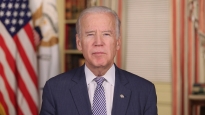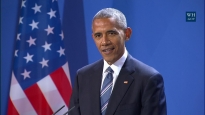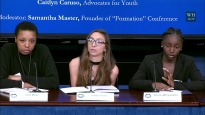President Obama on Meeting with Bank CEOs
December 14, 2009 | 8:21
The President talks about the importance of loosening access to credit and the necessity of financial regulatory reform in remarks following his meeting with financial and banking leaders at the White House. December 14, 2009. (Public Domain)
Remarks by the President on the Economy
12:38 P.M. EST
THE PRESIDENT: Good afternoon, everybody. I've just finished a candid and productive meeting with the CEOs of 12 of our nation's largest financial institutions. I asked them to come to Washington today -- at the end of this difficult year for their industry, but also for the economy -- to discuss where we've been, what we expect of them going forward, and how we can work together to accelerate economic recovery.
Our nation's banks play, and have always played, a crucial role in our national economy -- from providing loans for homes and cars and colleges; to supplying the capital that allows entrepreneurs to turn ideas into products and businesses to grow; to helping people save for a rainy day and a secure retirement. So it's clear that each of us has a stake in ensuring the strength and the vitality of the financial system.
And that's why one year ago, when many of these institutions were on the verge of collapse -- a predicament largely of their own making, oftentimes because they failed to manage risk properly -- we took difficult, and, frankly, unpopular steps to pull them back from the brink, steps that were necessary not just to save our financial system, but to save our economy as a whole.
Today, due to the timely loans from the American people, our financial system has stabilized, the stock market has sprung back to life, our economy is growing, and our banks are once again recording profits. A year ago, many doubted that we would ever recover these investments, but we've managed this program well. This morning, another major bank announced that it would be repaying taxpayers in full, and when they do, we'll have collected 60 percent of the money owed -- with interest. We expect other institutions to follow suit, and we are determined to recover every last dime for the American taxpayers.
So my main message in today's meeting was very simple: that America's banks received extraordinary assistance from American taxpayers to rebuild their industry -- and now that they're back on their feet, we expect an extraordinary commitment from them to help rebuild our economy.
That starts with finding ways to help creditworthy small and medium-size businesses get the loans that they need to open their doors, grow their operations, and create new jobs. This is something I hear about from business owners and entrepreneurs across America -- that despite their best efforts, they're unable to get loans. At the same time, I've been hearing from bankers that they're willing to lend, but face a shortage of creditworthy individuals and businesses.
Now, no one wants banks making the kinds of risky loans that got us into this situation in the first place. And it's true that regulators are requiring them to hold more of their capital as a hedge against the kind of problems that we saw last year. But given the difficulty businesspeople are having as lending has declined, and given the exceptional assistance banks received to get them through a difficult time, we expect them to explore every responsible way to help get our economy moving again.
And I heard from these executives that they are engaging in various programs like "second look" programs, hiring more folks, raising their target goals in terms of lending -- all of which sounded positive, but we expect some results, because I'm getting too many letters from small businesses who explain that they are creditworthy and banks that they've had a long-term relationship with are still having problems giving them loans. We think that's something that we can -- that can be fixed. And so I urged these institutions here today to go back and take a third and fourth look about how they are operating when it comes to small business and medium-sized business lending.
We also discussed the need to pass meaningful financial reform that will protect American consumers from exploitation and American -- the American economy from another financial crisis of the kind which we just came out of.
I noted the resistance of many of the financial sectors to these reforms -- the industry has lobbied vigorously against some of them -- some of these reforms on Capitol Hill. So I made it clear that it is both in the country's interest -- and ultimately, in the financial industry's interest -- to have updated rules of the road to prevent abuse and excess. Short-term gains are of little value to our banks if they lead to long-term chaos in the economy.
And I made very clear that I have no intention of letting their lobbyists thwart reforms necessary to protect the American people. If they wish to fight common-sense consumer protections, that's a fight I'm more than willing to have.
The way I see it, having recovered with the help of the American government and the American taxpayers, our banks now have a greater obligation to the goal of a wider recovery, a more stable system, and more broadly shared prosperity.
So I urged them to work with us in Congress to finish the job of reforming our financial system to bring transparency and accountability to the financial markets; to ensure that the failure of one bank or financial institution won't spread throughout the entire system, and to help protect consumers from misleading and dishonest practices with products like credit and debit cards, with mortgages and auto and payday loans.
Now, I should note that around the table all the financial industry executives said they supported financial regulatory reform. The problem is there's a big gap between what I'm hearing here in the White House and the activities of lobbyists on behalf of these institutions or associations of which they're a member up on Capitol Hill. I urged them to close that gap, and they assured me that they would make every effort to do so.
In the end, my interest isn't in vilifying any one person or institution or industry; it's not to dictate to them or micromanage their compensation practices to ensure that consumers and -- my job is to ensure that consumers and the larger economy are protected from risky speculation and predatory practices, that credit is flowing, that businesses can grow, and jobs are once again being created at the pace we need.
Some of the banks and financial institutions have taken small but positive steps to improve lending to small and medium-sized businesses, as I indicated. They've begun reworking mortgages that are now underwater because of declining home values, and they have acknowledged that much more needs to be done going forward. Many have begun to follow our lead in shifting from paying huge cash bonuses to awarding long-term stock, which will encourage more prudent decision-making -- but, as I indicated in this meeting, they certainly could be doing more on this front as well.
These efforts reflect a recognition ultimately that the fate of our financial institutions is tied to the fate of our economy and our country -- and these institutions can't endure if workers don't have jobs, and businesses can't grow, and consumers don't have money to spend. Ultimately, in this country, we rise and fall together -- banks and small businesses, consumers and large corporations, and we have a shared interest in working together to ensure a lasting recovery that will benefit all of us and not just some of us.
I called today's meeting with this in mind, and I told the group that I look forward to continued engagement and progress in the months and years ahead.
Thank you.
END
12:46 P.M. EST
|
November 19, 2016
|
November 18, 2016
|
November 17, 2016
|
November 16, 2016
|
|
November 15, 2016
|
November 15, 2016
|
November 15, 2016
|
November 15, 2016
|
- &lsaquo previous
- …
- 7
- 8
- 9
- 10
- 11
- 12
- 13
- 14
- 15
- …
- next &rsaquo







